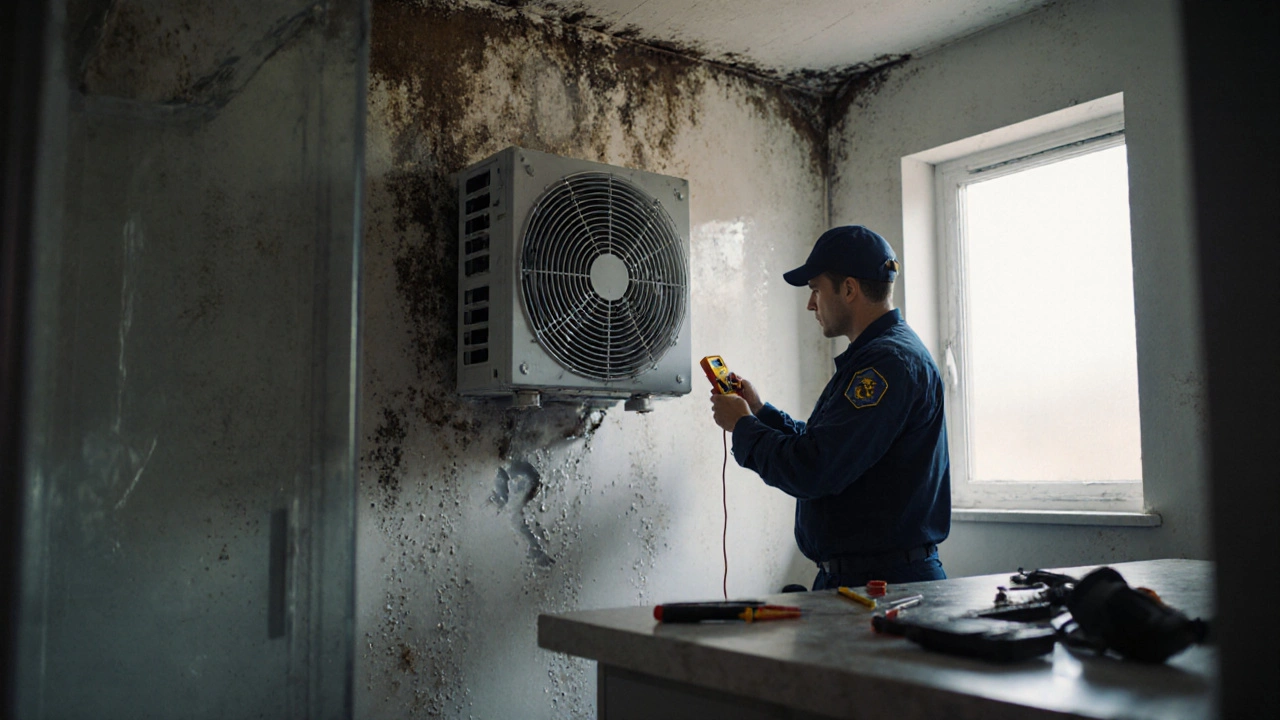Ever wondered what happens when you skip using an extractor fan? You might think it’s not a big deal, but the consequences can sneak up on you. It's not just about a little extra steam in the air. We're talking about some serious effects on both your home and health.
First, let's talk moisture. Without an extractor fan, all that steam from your cooking or showering hangs around and settles on surfaces. Over time, this can lead to mold growth. And mold? Definitely not something you want. It can damage your walls and ceilings and cause health issues, especially for those with respiratory problems.
Then there's air quality. Without proper ventilation, you're basically trapping air pollutants inside. Odors, grease particles, even carbon monoxide can build up without an exit route. Breathing cleaner air? Kind of a big deal.
- Why Extractor Fans Matter
- Consequences of Not Using One
- Impact on Health and Home
- How to Maximize Efficiency
- Common Repair Tips
- When to Call a Professional
Why Extractor Fans Matter
So, why do you really need an extractor fan? The truth is, they’re way more important than most folks realize. These handy devices work hard to keep your space healthy and fresh. Let's break down a few solid reasons why they're a home essential.
Keeping Moisture in Check
Moisture is like that uninvited guest that just won't leave! Whether from shower steam or cooking stove heat, without a ventilation system like an extractor fan, all that humidity stays indoors. Moisture build-up isn’t just annoying—it can lead to mold and mildew, staining walls and deteriorating fittings.
Improving Air Quality
Did you know indoor air can be more polluted than the outdoor air? A lack of proper ventilation means pollutants, like carbon monoxide from stoves and grease particles, accumulate. An extractor fan helps whisk away these pollutants, keeping the air you breathe fresher every day.
Odor Control
Who loves the smell of last night’s dinner lingering in the morning? Nobody, really. Strong kitchen odors can stick around, but an extractor fan sucks them right out, leaving your home smelling fresh.
Reducing Grease Build-up
Cooking can release oily particles that settle as greasy grime on cabinets and tiles. With regular use of an extractor fan, these particles get sucked away with the smoke, saving you from extra cleaning work.
Energy Efficiency
By helping regulate moisture and temperature, extractor fans can also play a part in your home’s energy efficiency. Less moisture means less strain on your heating and cooling systems.
In a nutshell, skipping on using your extractor fan might initially seem harmless, but its absence can lead to a whole host of problems. No one wants poor air quality, extra cleaning jobs, or unnecessary repair bills. So go ahead, let your extractor fan do its thing and keep your home healthier.
Consequences of Not Using One
Ignoring your extractor fan might seem harmless, but let’s dive into what really happens when you don’t turn it on. Think of it as skipping a crucial step in making your home a healthy space.
Moisture Build-Up
No extractor fan means excess steam and moisture hanging tight in your kitchen or bathroom. This trapped moisture is more than just a visual nuisance. It invites mold and mildew, which can quickly start ruining your walls, ceilings, and even your countertops.
Poor Air Quality
Without a fan pulling out stale, polluted air, you’re living in a bubble of unpleasant odors and harmful particles. Cooking releases grease particles and invisible gases that can stick around long after the meal ends. The absence of ventilation could also mean a dangerous build-up of carbon monoxide if your home utilizes gas appliances.
Health Risks
Breathing in mold spores or lingering air pollutants can adversely affect your health, targeting even the healthiest among us. People with asthma or allergies are especially at risk in poorly ventilated areas.
Damage to Home Structure
Long-term neglect of air circulation leads to greater damages. Moist air can weaken structural elements over time. Those pretty wooden cabinets? A damp environment will take them down a notch, causing them to warp and deteriorate faster.
| Consequence | Potential Damage |
|---|---|
| Mold Growth | Walls, Ceilings, Health |
| Airborne Pollutants | Respiratory Health, Odors |
To sum up, not using your extractor fan can turn everyday challenges into daunting problems. Keep in mind, a little ventilation goes a long way in preventing these headaches down the road.
Impact on Health and Home
Let's break it down: skipping the use of an extractor fan might seem harmless, but it can seriously backfire. Your health and the structure of your home can take a hit. Crazy, right?
Health Concerns
Breathing is pretty essential, so keeping the air quality up to par is crucial. Without an extractor fan, pollutants like smoke, carbon monoxide, and even cooking smells lurk around. Over time, these can aggravate asthma symptoms, trigger allergies, and lead to respiratory infections. And no one wants to feel like they're living in a stuffy, polluted environment.
If you're asthmatic or have little ones around, it’s even more vital. Kids and seniors tend to be more sensitive to poor air quality. Makes sense, right?
Structural Damage to Your Home
Think of your home as a living, breathing thing. Without proper ventilation, moisture clings, especially in places like the kitchen and bathroom. You might start spotting mold or mildew, which can eat away at your walls, ceilings, and even your home's foundation over time. Nobody wants to deal with that mess!
Mold isn't just an eyesore; it compromises the structural integrity of your house. Your cozy abode could end up needing costly repairs, and who wants to spend money on something that could be easily avoided?
Ever heard of the saying 'A stitch in time saves nine'? Keeping your extractor fan in good working condition is a small, but essential step to ensuring your home stays healthy.
Side Note: Moisture Monsters
Excessive moisture also invites unwanted visitors like dust mites and other allergens. These little guys thrive in moist environments and can contribute to respiratory issues. So next time, think twice before ignoring that fan switch!
Hopefully, this breaks down why an extractor fan is more than just a noisy box stuck to your wall. It plays a key role in keeping your home and health in check.

How to Maximize Efficiency
Want to make sure your extractor fan is doing its job? You've got to keep it in tip-top shape. Here’s how you can up your ventilation game and ensure everything's running smoothly.
Regular Cleaning
First things first, regular cleaning is key. A clogged filter can mess with airflow. To keep air moving, clean those filters at least every three months. Grease builds up faster than you'd think.
- Remove the filter carefully and soak it in hot, soapy water.
- Use a gentle scrub to get rid of stubborn grease.
- Rinse and let it air dry before putting it back.
Check for Blockages
Is your fan making weird noises? It might be a blockage. Dust, debris, or even small critters can find their way into vents. Make it a habit to check and clear any obstructions regularly.
Upgrade When Necessary
If your fan’s been around since the dark ages, it might be time for an upgrade. Modern fans are more efficient and quieter. They come with added features like sensors that know just when to start up.
Efficient Usage Tips
How you use your fan also matters. Turn it on before you start cooking or showering to get ahead of moisture and odors. And don't switch it off the second you’re done. Leaving it on for an extra 10-15 minutes can make a big difference.
Monitor for Repairs
Keep an ear out for any odd sounds or dips in performance. It's easier to fix small problems before they become big ones. If DIY fixes don’t work, don’t hesitate to call in a professional.
- Extractor fan repair isn't just about fixing what's broken. It's preventive maintenance, ensuring everything operates correctly.
Following these steps can really boost your fan’s lifespan and efficiency, saving you money and hassle in the long run.
Common Repair Tips
Dealing with extractor fan issues can seem like a hassle, but with the right approach, most problems are pretty fixable. Here’s a breakdown of some common repairs you might find yourself tackling.
Check the Power Supply
One of the most common issues is simply a lack of power. Before diving into complex repairs, start simple: make sure the fan is plugged in and that the circuit breaker hasn’t tripped. Sometimes it's the basics that are the root cause.
Clean the Filters
If your fan is making strange noises or isn't venting well, clogged filters might be to blame. Over time, grease and dust build up and block airflow. To clean them:
- Unplug the fan for safety.
- Remove the filters carefully.
- Soak them in warm, soapy water to remove grease.
- Let them dry completely before reinstalling.
Done regularly, this can really improve performance, and keeps your fan in top shape.
Inspect the Motor
If the extractor fan repair involves weird noises or vibrations, you’ll want to check the motor. Ensure there’s no debris blocking the blades from rotating freely. If it’s older, consider lightly lubricating the motor with some machine oil. But if you’re not sure about this, it might be time for a professional’s touch.
Fan Blade Issues
Check out the fan blades. If they’re bent or damaged, this can cause imbalance and noise. Gently realign minor bends or replace the blades if necessary. Keeping them clean can also prevent sticky build-up from gunking up the works.
Consider Replacement Parts
Sometimes it’s not about fixing but replacing. Examine parts like the duct connector and the backdraft damper for wear. They’re key to maintaining ventilation efficiency. If they look worn or aren't functioning properly, swapping them out could make a world of difference.
Schedule Regular Maintenance
The best repair tip? A little prevention goes a long way. Every few months, give your fan a thorough once-over. Clean filters, check the ventilation, and make sure everything’s running smoothly. It saves you hassle and keeps air quality where it should be.
When to Call a Professional
Alright, so you’ve been trying to deal with your extractor fan repair issues on your own. But sometimes it’s best to leave it to the pros. Here’s when you should pick up the phone and call in the experts.
Understanding Fan Malfunctions
Not all fan noises are created equal. A little hum is fine, but screeching or grinding sounds? That's a sign you could be dealing with a worn-out motor or other mechanical issues. Don’t wait too long, as ignoring this could just make things worse.
Dealing with Electrical Concerns
If the fan frequently cuts out or doesn’t turn on, it might be an electrical issue. Changing a lightbulb is one thing, but messing with wiring can be risky business. Don't play electrician—it’s safer to have someone qualified handle it.
- Frequent short-circuiting or tripping of breakers.
- Unusual burning smells when the fan is in use.
- Visible frayed or exposed wires.
When Moisture Becomes a Problem
If you notice persistent moisture issues despite using the fan, you might have a more extensive problem that simply increasing ventilation won’t solve. Professionals can identify if it's due to inadequate fan capacity or a blockage in the ductwork.
The Professional Advantage
What can a professional do that you can't? For starters, they have tools and diagnostic equipment you probably don’t. Many reputable services offer a quick turnaround, and you usually get a nice warranty on repairs.
Find the Right Professional
Make sure you hire someone experienced in extractor fan repair. Always check reviews, ask for quotes, and ensure they’re certified. This isn’t just about getting the fan running—it’s about making it last.
Bringing in a pro might seem like an extra expense, but it’s often cheaper than tackling half the problem yourself only to need a full repair later. Plus, they can help prevent bigger, costlier problems down the line. Peace of mind? Totally worth it.



